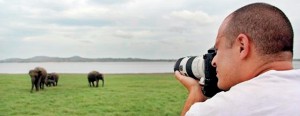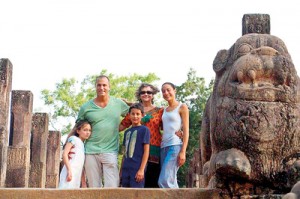‘Seeing’ a new country
View(s):Chatting over post-dinner drinks and an enthralling performance by performers of the traditional martial arts – Agampora – at the Cinnamon Bey at Beruwela on Monday night, Nigel Barker is asked, “Is there something special that you would like to take home as a souvenir?”

In the field: Nigel at Minneriya
Letting his thoughts flow, sipping some wine in between, Barker, one of the world’s famous fashion photographers pauses, draws his breath and says: “In the past five years Buddhism has made a great impact on my life. Yes … I would love a statue of the Buddha”.
Barker and his family have spent about a week essentially tracing his Sri Lankan roots and travelling. The 43-year-old former model turned fashion photographer and spokesperson for many global causes had visited Sigiriya, Minneriya, Kandy, Pinnawela and was heading to Yala on Tuesday before addressing two widely-publicised events in Colombo on Thursday including a book-signing.
Sitting down for an interview with the Sunday Times, in the company of his wife Cristen and children – Jack and Jasmine, and mother Gillian, the New York-based celebrity literally poured his heart out talking about the warmth of the people and the country he is rediscovering. He had visited Sri Lanka with his father many years ago when he was just six.
This visit, hosted and organised by Cinnamon Hotels & Resorts, has many memorable moments. In one incident this week, Nigel is relaxing over dinner with his family and friends by the side of the Habarana Lodge lake when he hears the loud trumpeting of elephants from the nearby shrub jungle. Describing it as an exciting experience, Nigel said: “That was stunning, unbelievable. From afar it goes to the core of the feeling of being a human. It takes you back to whatever primal state (we were in). It woke up a sense in me that I have literally not felt before … fear, hunger, excitement, sensual, nostalgia”.
He has strong views on many worldly things, saying that while elephants have been part of Sri Lankan culture for years, saluted, celebrated, worshipped and put in museums like in other countries, using them for work is not wrong.
“I loved watching the mahout washing his elephant (at Pinnawela) in a loving and caring manner. The reality is that these are the ways of the world. Yes, we can live in a Utopian society where animals are free and roam as they do but the world doesn’t work that way. So if they are not abused and are taken care of and there is support for these work animals, I’m not someone who’ll condemn those who work elephants.”
The English reality TV show personality, author and filmmaker, and former model is best known globally for his role as a judge and photographer on the Tyra Banks reality show ‘America’s Next Top Model’ and now hosts his own reality show ‘The Face’ featuring supermodel coach Naomi Campbell. ‘The Face’ is in its second season. He has also been a judge for the Miss America Pageant in 2007 and Miss Universe Pageant in 2012.
Emotions, thought-processes and ideas flow as he speaks ‘from the heart’ about Sri Lanka and his roots. “People don’t often ask me about my roots and I am quite happy about it. Sometimes I think the message is too much about I being Sri Lankan and therefore (people out there) feeling sorry or happy for me and whatever I do.”
Sri Lankans, he strongly believes, should go out into the world and be successful not because they are Sri Lankans and people feel sorry for them or because the country has gone through a war but because they are talented.

Family holiday: Nigel with his wife Cristen, children Jack and Jasmine and mother Gillian
“Success should be based on talent, real talent and there’s loads of it here. Fellow citizens may be proud that you are a Sri Lankan but the world doesn’t care. The world cares about talent… not from where you are,” he says, adding that he planned to give this message at Thursday’s workshop.
On his part, he likes to think of himself as a world citizen. “Look I am part Sri Lankan, part English, an American citizen, lived across the world, worked in Paris, Milan, Italy, Germany, Barcelona, Miami, Los Angeles,” he says.
Traversing the world as a fashion photographer has given him an insight to many places, people, societies and cultures, and he finds Sri Lankans stand out. “I have travelled a lot in this past month alone – to the Philippines, Hong Kong, London, Italy, across the US and now here. Those were about hotels, rooms, cities but this is a nation that has been moved by the times.”
“You could have the best beaches in the world, the best of this, the best of that but without people, you’re nothing. I have seen everything, literally been everywhere and it’s always people that matter to a nation, to visitors. And, Sri Lanka has that!”
Just after arriving in Sri Lanka and driving through the countryside, his memory of visiting the country as a child changed quickly. “It was like a shocker because the people have become so warm. As a six-year-old child I remember the animals, wild life, sun and beaches but this time what has been stunning is that people have a heart, kindness is overflowing. There is a sense that the war is over after 30 years and people wanting to do the right thing. I felt this warmth and affection across … from everybody who worked at Cinnamon hotels, those who helped with the bags, the manager, restaurant staff, the gardener, farmers, tea workers, etc.”
At every point of the conversation, seated in the comfortable settees of the Cinnamon Bey lounge, Nigel keeps coming back to the ‘value of the people’ and ‘the end of the conflict’. “I feel it … I sense it. People are desperate to express themselves now that the war is over and freedom is there. People come and talk to us, smile on the streets. There is a desire to dress well, to be smart and present themselves well. You find this all over, the cadjunut sellers, small entrepreneurs. There is a sense of national pride in whatever they do with an entrepreneurial flame flickering here and there.”
While many businessmen would want to come and invest here given this new-found spirit of the people, he believes Sri Lankans also need to be smart and not buy into whatever is offered. “Sri Lankan businessmen should believe in themselves. You must not wait for someone to tell you ‘you got it’. You have to believe in yourself that you got it and move forward.”
Having seen the world not only through the eyes of a fashion photographer for the past 20 years but also as a curious observer of the ways of the world, Nigel who has a 2.5 million following on social media has some words of advice for talented Sri Lankans:
“Don’t expect someone to tell you that you deserve it (exposure). The world doesn’t work that way. What needs to be done is being given a fair chance to showcase what you can do and let the world decide whether you are worth it. I think Sri Lankans need that fair chance.”
| Hectic visit for Nigel’s mother For Gillian Barker, mother of Nigel Barker, this has been one of many visits over the past two decades but much more hectic than before. “I have seen places in Sri Lanka in the past week much more than in all my other visits,” she told the Sunday Times.Married to a Scotsman and living in Scotland for many years, Gillian, now 72 years, often stays with her half-sister and famous dancer Oosha Saravanamuttu when visiting. They both had the same mother, Ms. de Livera while Gillian’s father was English. “I’ll be staying with them for a month here,” she says, excited to be back. Returning to Ceylon in 1949 just after independence, she schooled at Lindsay, Methodist and Ladies’ Colleges before embarking on a singing career at the age of 17. Gillian was a contestant in the Miss Sri Lanka pageant but was subsequently disqualified because others had complained that she was half-English. “I have been to Sri Lanka many times and seen many changes after the tsunami and the end of the war. It’s wonderful to see these big hotels and infrastructure is improving. The standard of living is better but in some places it hasn’t changed,” she said. |


